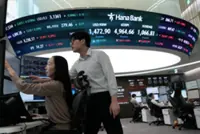BANGKOK (Reuters): Indonesian stocks slumped on Friday, bringing a bruising week to an end as concerns over the country's fiscal health weighed, while most Asian currencies were on the defensive on trade war uncertainties.
Jakarta stocks slipped 1.6% after a short-lived rebound from Tuesday's sell-off, which triggered a trading halt.
The benchmark stock index is down more than 11% for the year so far, making it among the worst performers in Asia. Investors' confidence in South-East Asia's largest economy has been dwindling due to growing concerns over fiscal health, government policies and weakening domestic demand.
"It's been a tough week for Indonesian markets; foreign outflows, currency pressure, and political noise have all weighed on sentiment," said Mohit Mirpuri, a fund manager at Singapore-based SGMC Capital.
"The passing of the military law yesterday only added to concerns. Until the long break, we expect markets to stay under pressure. Q2 could bring some relief, especially if there are clear stimulus measures or signals of policy stability."
The Indonesian rupiah inched down 0.2% and was headed for its second consecutive weekly drop.
The US dollar rebounded from five-month lows after the U.S. Federal Reserve indicated there was no rush to cut interest rates.
Meanwhile, market anxiety heightened over President Donald Trump's trade tariffs and the potential economic risks, prompting risk-averse investors to seek safe-haven assets, with gold close to record highs.
Asian currencies weakened, with the Thai baht and the Philippine peso dropping 0.3% and 0.2%, respectively.
While the direct economic impact from the tariffs will take time to filter through, ANZ analysts said the indirect effect, via the impact on confidence, was already apparent.
"The upcoming tariff announcement by the US government on April 2 could be the catalyst for further investor selling if it is more aggressive than expected. The continuation of outflows will weigh on the region's asset prices and currencies, which could limit the extent of monetary policy easing."
Regional stock markets were mixed.
MSCI's index of international emerging markets equities fell 0.6%. Manila equities dropped 0.9% and Taipei stocks fell 0.8%. Kuala Lumpur stocks rose 0.3%, but were set for their fourth straight weekly drop. Stocks in Bangkok rose 0.3% and were on track for their first weekly gain in eight weeks. - Reuters





